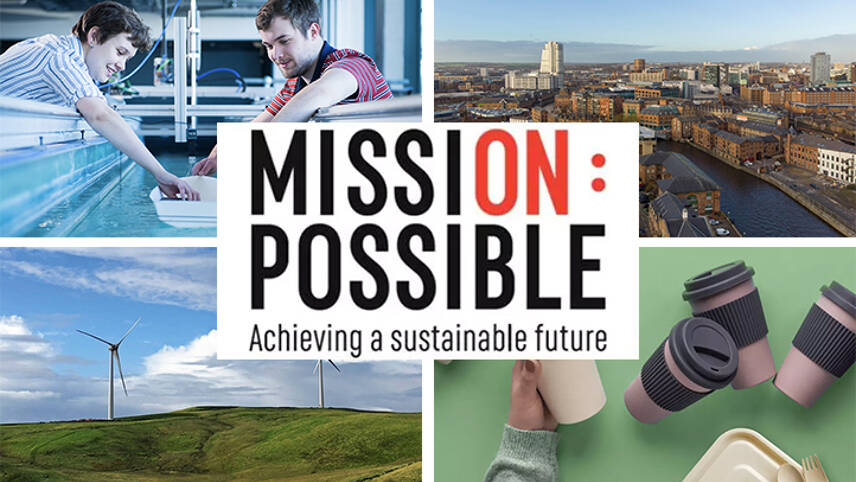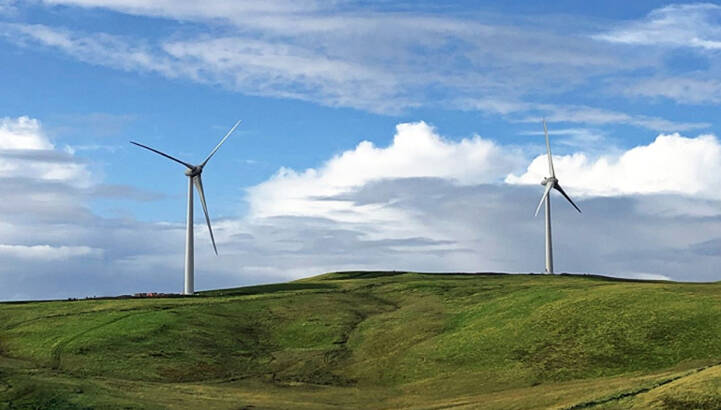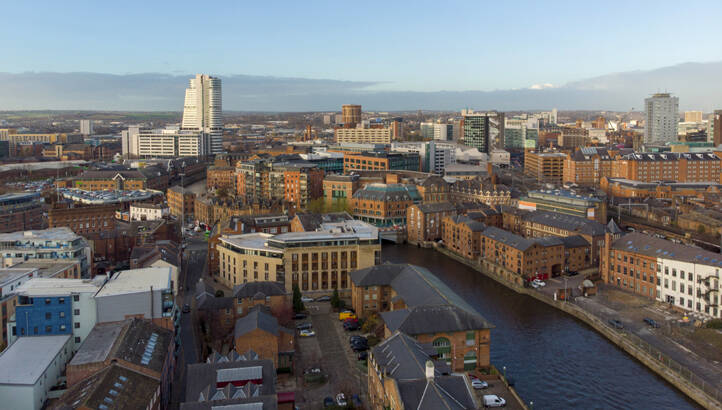Register for free and continue reading
Join our growing army of changemakers and get unlimited access to our premium content

Published every week, this series charts how businesses and sustainability professionals are working to achieve their ‘Mission Possible’ across the campaign’s five key pillars – energy, resources, infrastructure, mobility and leadership.
Across the UK and the world, leading businesses, cities, states and regions are turning environmental ambitions into action. Here, we round up five positive sustainability stories from this week.
ENERGY: BT signs virtual PPA for Scottish wind farm
Image: BayWa r.e.
Telecommunications giant BT has signed a virtual power purchase agreement (VPPA) with BayWa r.e. that will support a 45MW onshore wind project in Scotland.
The ten-year VPPA will see BT purchasing 80% of the output of the Dalquhandy wind farm in South Lanarkshire. In a VPPA, the corporate buyer does not have the responsibility to physically offtake electricity, so BT will receive the REGO certificates associated with the generation.
BT and BayWa r.e. have worked together previously on a PPA. In 2014, the company signed an agreement to offtake power from the 30MW Stroupster project in the Scottish Highlands.
“As one of the largest private purchasers of electricity in the UK, [this] announcement underpins our commitment to use 100 % renewable electricity worldwide where markets allow and sends a clear signal to the market that renewable energy is a key enabler to reach net-zero by 2050 in the UK,” said BT Group’s chief procurement officer Cyril Pourrat.
RESOURCES: Starbucks allocates £1.4m to refill innovators in the UK
Image: Hubbub
Starbucks UK has announced seven projects to receive a share of its ‘Bring it Back’ fund, launched in a bid to support innovative reuse solutions for food and beverage packaging. The money has been raised through the coffee chain’s charge on single-use paper cups, with Starbucks originally planning to allocate £1m, but increasing the fund to £1.4m as it received many high-quality applications.
Environmental charity Hubbub has been assisting Starbucks UK with allocating the fund. Projects selected to receive a share span from South London, to Bradford, Edinburgh and the Scottish Highlands.
Funding is being provided to projects working within different parts of the reuse and refill economy, including container cleaning, RFID-enabled container tracking and consumer behaviour change research.
Starbucks UK’s general manager Alex Rayner said: “It is important for us as a company that we continue to drive industry-wide innovation, as we work to increase reusability and inspire greater reusables uptake in local communities across the UK.”
MOBILITY: Centre for Future Clean Mobility opens in Exeter
Lockdowns aside, transport has been the UK’s highest-emitting sector since 2016. This makes it a key challenge on the road to net-zero.
Seeking to help solve this challenge is the University of Exeter, which has opened a new ‘Centre for Future Clean Mobility’ at Exeter Science Park. The facility will be used to conduct R&D projects spearheaded by academics from the University, often involving partners from the private sector. Transport sub-sectors covered by the Centre’s work are marine, off-highway, rail and defence. There will also be a focus on upgrading energy systems to cater for new forms of transport.
The Centre was developed with £2m of grant funding from the Heart of the South West Local Enterprise Partnership.
The University’s Vice-Chancellor Lisa Roberts said: “As a research-intensive University, one of our key missions is to work with our partners to lead meaningful action against the climate emergency and ecological crisis. CFCM are going beyond borders and boundaries to create innovative solutions to make our roads, rail, sea, and air zero carbon. Partnering with businesses and organisations, their work is truly making a difference to the future of our planet and importantly, fuelling economic growth at the same time.”
THE BUILT ENVIRONMENT: Ibstock hosts supplier engagement day as BAM sets net-zero target
On Monday (3 October), edie covered news of BAM UK & Ireland setting a 2026 net-zero target. The scope of the target covers all direct (Scope 1) and power-related (Scope 2) emissions, as well as some Scope 3 emissions where the business believes it has “significant influence”.
In another positive sign of climate action in the UK’s built environment sector, brickmaker Ibstock hosted a supply chain engagement day attended by 30 of the suppliers who have a “significant material impact” on its Scope 3 emissions, including CEMEX, Aggregate Industries and Berry.
Around one-third of the business’s emissions footprint falls into Scope 3, making supplier engagement critical to delivering its 2040 net-zero target. The day saw suppliers receiving information on how to better measure and reduce their emissions, and collaborating to identify opportunities to work together.
“Coming together to discuss the sustainability challenges being faced across our supply chain is a crucial part of our shared decarbonisation journey,” said Ibstock’s group procurement manager Joe Fox. “We can only succeed by building a mutual understanding of the opportunities for change.”
BUSINESS LEADERSHIP: Leeds reduces business rates for purpose-led firms
Research published in September revealed that B Corp certified firms and other purpose-led businesses in the UK are better placed to weather the challenging economic conditions of 2022 and 2023, and more likely to be supporting staff and suppliers.
It is welcome news, then, that Leeds City Council has launched a new business rate relief scheme for SMEs that it classes as “making a positive contribution to inclusive growth”.
Social enterprises, businesses with a social and/or civic purpose and SMEs in their first three years of trading will need to supply for the discounted rate. They will also need to sign a corporate responsibility pledge, committing to improve skills and employment in the community. The council hopes that these businesses will use the savings to ease pressures on operating costs or invest in innovation, research and development.
“The scheme directly supports the council’s inclusive growth strategy, by supporting business in the creation and retention of quality jobs in the face of current economic pressures,” said the council’s executive member for economy, culture and education, Cllr Jonathan Pryor.







Please login or Register to leave a comment.